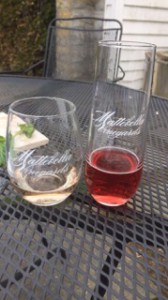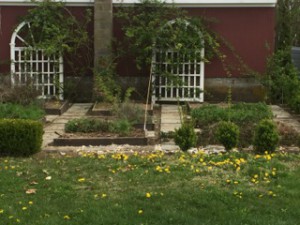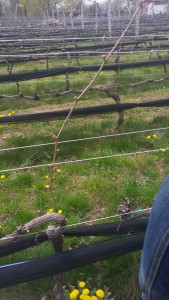My two friends and I had the pleasure of getting an insightful tour of Mattebella vineyard by John Roselli.
Mattebella is a small vineyard that practicesorganic and sustainable agriculture to maintain their vines. In 1996 – 1997 the layout of this vineyard was strategically created to produce the best possible quality of grapes. The first step to cultivating the perfect grapes for the creation of “elegant and stylish wines that would pair well with food” was creating the perfect soil conditions. All 15 acres of Mattebella’s vineyard was dug up in order to create the perfect balance of slate, gravel, sand, and clay 10 feet under the vineyard. The slate was added to the soil to help the ground retain heat, while the gravel was introduced to the soil combination to create a system of drainage, while minimizing the levels of acidity in the grapes. Similarly to gravel, sand is utilized for its drainage, clay on the other hand is used to offset the drainage characteristic of gravel and sand and to retain water. (Wikipedia 5/6/2016)
The next step to creating an ideal vineyard is creating the right position of the vines. At Mattebella vineyard their vines are planted using the European Style. This means that the vines are planted 3 feet by 6 feet away from each other. This helps to create a competitions ion between the roots of the vines for water. Also while creating the vineyard all American root stocks were grafted with the vines. In an attempt to maintain the work done about 20 years ago on this cultivated field, the vines are constantly being maintained throughout the year.
Pruning is usually done in February so that the vines are ready when August comes around and the grapes begin to veraison (Wikipedia 8/29/15). That is around the same time that support wires are reinforced to help vines grow up right. Rose bushes are planted in front of every few rows of vines because roses are more susceptible to anything that could potentially harm the vines. This helps the vineyard manager know what is going on with the vines without having to walk through every row.
There are 6 clones of Chardonnay grown at Mattebella vineyard, along with Merlot, Cabernet Sauvignon and Cabernet Franc, which is the vineyards star grape variety. The drop fruit method for is used for all of Mattebella’s 49 rows of vines so that the waist high vines can concentrate all of its energy on injecting the most flavor into the few clusters that are still connected to the vines. More clusters of Chardonnay are left on the vine then for the Merlot. The vines are hand harvested by groups of 8 to 12 people using small containers called lugs that are designed to hold and maximum of 35 pounds of grapes without creating pressure on the grapes that could cause them to break.
During our tour we mainly spoke about the Vinification and Viticulture of the vineyard. Due to the size of the vineyard, the wines were not made onsite. Mattebella vineyard has a contract with a nearby vineyard that allows them to rent some of their tanks and barrels to produce their wines and Roses
https://en.wikipedia.org/wiki/List_of_vineyard_soil_types
https://en.wikipedia.org/wiki/Veraison










I think more and more Vineyard owners care about sustainable practice for their vine growing now.
Great technical information and an in depth look at the viticulture of the winery. A lot of your learning was expressed in this blog.